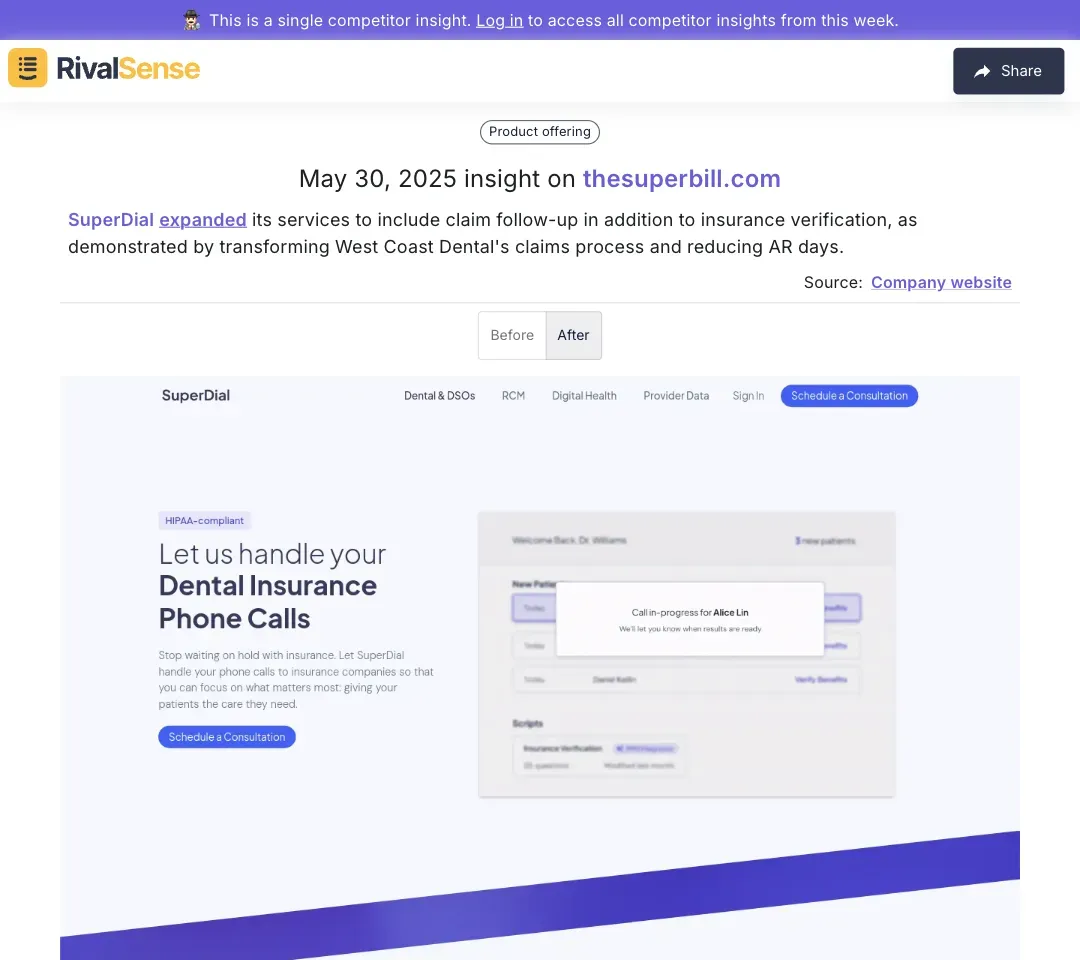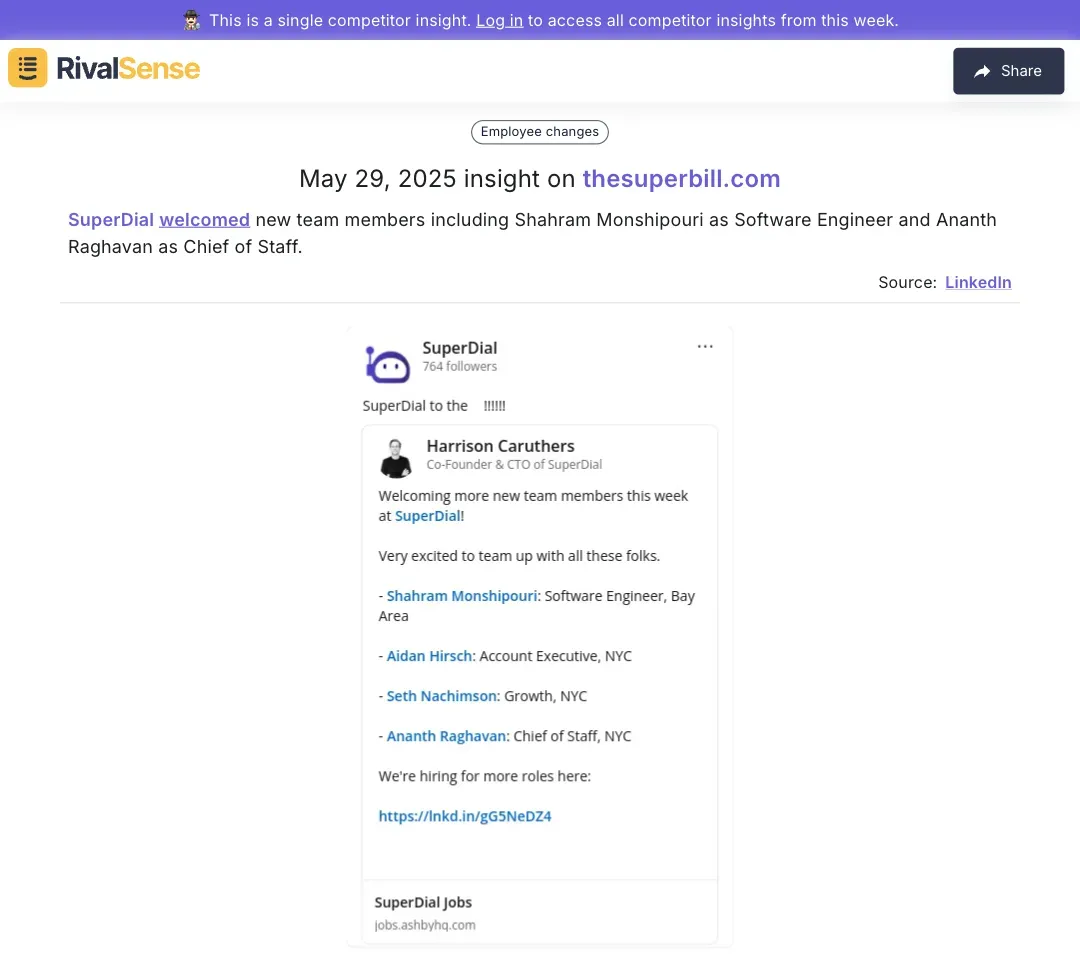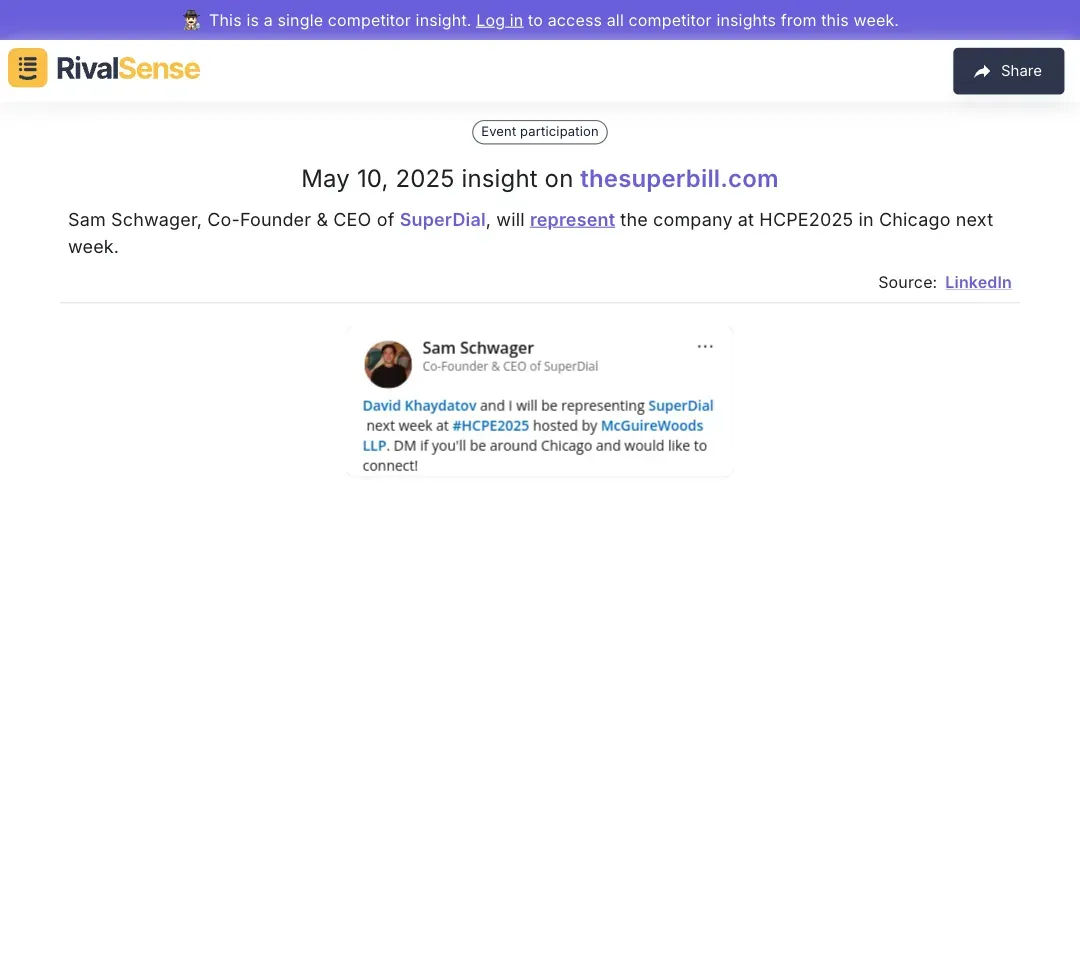4 AI-Driven Strategies for Competitive Intelligence in Healthcare
In the rapidly evolving healthcare sector, staying ahead requires more than traditional market research. Artificial Intelligence revolutionizes competitive intelligence by delivering deeper, faster, and more actionable insights through machine learning and predictive analytics. For healthcare leaders, these AI-driven insights create significant competitive advantages by anticipating market shifts and optimizing strategies.
From tracking competitor developments to analyzing patient feedback, AI processes vast data with unmatched accuracy. In this post, we explore four key AI-driven strategies:
- AI-Optimized Service Expansion
- Strategic Talent Acquisition
- Event Intelligence Maximization
- Real-Time Competitor Tracking
✅ Quick Start Checklist:
- Identify 3-5 key competitors in your niche
- Select AI tools matching your intelligence goals
- Integrate insights into quarterly strategic planning
- Establish metrics to measure CI impact
Strategy 1: AI-Optimized Service Expansion & Process Efficiency
Expanding services intelligently requires understanding competitor moves and market gaps. AI analyzes competitors' service changes and customer feedback to reveal expansion opportunities while identifying operational inefficiencies in your workflows. This dual approach ensures you grow strategically while optimizing existing operations.
Key Tactics:
-
Monitor Competitor Service Evolution: Track additions/modifications to competitors' offerings using AI web monitoring
- Example: RivalSense detected that SuperDial expanded services to include claim follow-up alongside insurance verification. This transformed West Coast Dental's claims process, reducing AR days significantly.

Why it matters: Spotting such expansions early reveals market needs and prevents competitive disadvantage. -
Automate Process Optimization: Implement AI-driven AR tracking with real-time alerts for billing delays
📋 Optimization Checklist:- Integrate AI with billing/EMR systems
- Set AR duration thresholds for alerts
- Pilot automation in high-volume departments first
-
Transform Workflows: Use AI to map and redesign inefficient processes like prior authorizations
→ Case Study: AI implementation reduced authorization processing from 72 to 8 hours at Midwest Medical Group
Strategy 2: Strategic Talent Acquisition for Innovation
Building future-ready teams requires anticipating skill gaps before they impact growth. AI analyzes workforce patterns and competitor hiring trends to identify critical talent needs. Specialized hires like AI engineers or operational roles directly enhance service innovation and execution capabilities.
Actionable Framework:
🔍 Leverage Hiring Intelligence Tools: Monitor competitor recruitment patterns for strategic signals
- Example: When SuperDial hired Shahram Monshipouri (Software Engineer) and Ananth Raghavan (Chief of Staff), RivalSense provided real-time alerts:

Why it matters: Such hires often precede new product launches or operational overhauls - intelligence that informs your talent strategy.
📊 Predictive Hiring Steps:
- Audit current team capabilities using AI skills-mapping
- Identify gaps using industry trend analysis
- Benchmark against competitor talent portfolios
- Prioritize roles with highest innovation impact (e.g., AI specialists)
⭐ Proven Impact:
- Chiefs of Staff improve cross-departmental efficiency by 30-40%
- Technical hires accelerate AI implementation by 6-9 months
Strategy 3: Maximizing Event Intelligence & Brand Presence
Industry events like HCPE2025 offer unparalleled competitive intelligence opportunities. AI tools analyze attendee demographics, competitor participation history, and real-time social sentiment to maximize your ROI. This transforms events from networking opportunities into strategic intelligence-gathering missions.
Event Excellence Framework:
🎯 Pre-Event Intelligence:
- Use AI to identify high-impact events based on competitor attendance patterns
- Example: RivalSense alerted users that Sam Schwager (SuperDial CEO) would attend HCPE2025:

Why it matters: Knowing competitor attendance lets you prepare counter-messaging and target their key prospects.
📋 Competitive Intelligence Checklist:
| Phase | Key Actions |
|---|---|
| Pre-Event | Research competitor speaking slots • Prepare battle cards |
| During | Monitor competitor booth traffic • Track social mentions |
| Post-Event | Analyze lead quality • Update competitor profiles |
💡 Pro Tip: Assign team members specific intelligence-gathering roles (e.g., competitor messaging analyst, attendee engagement tracker)
Strategy 4: Real-Time Competitor Tracking Systems
Static competitor reports can't match today's dynamic healthcare landscape. AI-powered tracking systems scan websites, registries, and social media 24/7 to deliver immediate alerts on critical moves. This transforms reactive strategies into proactive market leadership.
Implementation Blueprint:
🛠️ Tool Selection Criteria:
- Choose platforms with healthcare-specific monitoring (e.g., clinical trial registries, FDA databases)
- Prioritize solutions offering automated weekly digests with visual highlights
🚨 Critical Monitoring Areas:
- Pricing Changes: Detect hidden discounts or bundle offers
- Regulatory Moves: Track FDA submissions or compliance updates
- Partnership Signals: Identify new integration announcements
- Leadership Shifts: Monitor C-suite changes signaling strategic pivots
📈 Data Synthesis Protocol:
- Consolidate AI-generated alerts in centralized dashboard
- Cross-reference with internal performance metrics
- Hold biweekly strategy sessions to adjust tactics
Conclusion & Next Steps
These four AI-driven strategies—service optimization, talent intelligence, event leverage, and real-time tracking—create comprehensive competitive advantage in healthcare. By implementing even one strategy, organizations gain actionable insights to anticipate market shifts and outmaneuver competitors.
Immediate Action Plan:
- Audit current competitive intelligence practices
- Select one strategy to implement within 30 days
- Establish baseline metrics for ROI measurement
🔍 See these strategies in action: RivalSense automates competitor tracking across websites, registries, and social media - delivering actionable insights in weekly email reports.
Get your first competitor analysis today:
Try RivalSense Free
(No credit card required. Get instant access to your first competitor report)
📚 Read more
👉 AKASA vs. Competitors: AI in Healthcare Revenue Cycle Analysis
👉 Competitor Tracking on Autopilot: How RivalSense Delivers Effortless Competitive Intelligence
👉 Why One-Time Competitor Research Isn't Enough: The Case for Continuous Monitoring
👉 How to Track Competitor Engagement: A Strategic Guide for Business Leaders
👉 Mastering Competitive Intelligence in Medical Aesthetics: A Strategic Guide
